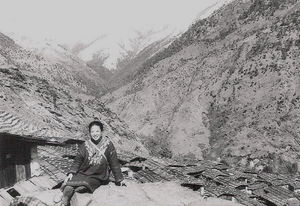Learning about the world through the humility and idealism of the Peace Corps

On a Save the Children US project in Gorkha, Nepal. | Photo Credit Frances Kai-Hwa Wang
When I was living in Kathmandu, Nepal, many years ago, working for various international development agencies, I was often mistaken for a Peace Corps volunteer, usually as I was hovering around a buffet table.
The nice people who were hosting whatever party or reception I had crashed would invariably ask: “Honey, are you Peace Corps? You must have just come in from the field. Here, have another piece of pizza.”
I was embarrassed, of course, to be caught hovering, and I worried about how hungry and dirty I must look, but since my mouth was invariably full, I could not stop them from loading up my plate.
Today, I am still not sophisticated and I still hover chronically around buffet tables, however, with all the Peace Corps’ 50th anniversary celebrations at the University of Michigan last week, I cannot help but be moved by the idealism that inspired it.
The idea of the Peace Corps started with a 2 a.m. challenge on the steps of the Michigan Union from then-presidential candidate Senator John F. Kennedy:
How many of you who are going to be doctors, are willing to spend your days in Ghana? Technicians or engineers, how many of you are willing to work in the Foreign Service and spend your lives traveling around the world?
At the National Symposium: The Future of International Service last week, Aaron Williams, the current director of the Peace Corps, said that part of the mission of the Peace Corps is to show the world the kind of country America is that would send her most precious resource — her sons and daughters (and increasingly, grandfathers and grandmothers too) — out into the world to help others. Peace Corps volunteers personify the United States’ generosity, compassion, talents, and creativity. Yet most returning Peace Corps volunteers report that they went because they wanted to help, but found that they got more out of the experience than they gave.
Returned Peace Corps Volunteer and Writer Paul Theroux spoke about how, in the Peace Corps, one realizes how small one is in the world, how insignificant, how little one knows. He went on a hysterical riff about how the experience of Peace Corps could have saved Dick Cheney’s soul. If Cheney (and others in Washington) had joined the Peace Corps instead of getting five deferments and going to Washington to pursue power, he could have learned something about the world instead — person to person, speaking the language, eating the food, learning the "wisdom of the ages" (like "buttocks produce friction" and "if your face is ugly learn to sing"), staying through the seasons.
Last summer, my father introduced my daughter Hao Hao (who wants to be a marine biologist) to his friend Roger, who had been a marine biologist with the Peace Corps. As the three of them worked together in water up to their chests cleaning the pond at Panaewa Rainforest Zoo in Hilo, Hawaii, Roger told Hao Hao a very long and sad story about sea cucumbers which began on the ocean floor and worked its way around the Pacific to China and back to Micronesia again and ended with: “If you do marine biology, you will be very happy but you will very poor.”
My father — the ever-practical engineer and immigrant — thought that that was that then, having heard only the message: “You will be very poor.”
What he did not realize, however, was that his adventurous granddaughter had heard only the message “You will be very happy” and had already inserted two years of Peace Corps between her college and graduate school plans.
Frances Kai-Hwa Wang is a second-generation Chinese American from California who now divides her time between Ann Arbor and the Big Island of Hawaii. She is editor of IMDiversity.com Asian American Village, lead multicultural contributor for AnnArbor.com, and a contributor for New America Media's Ethnoblog. She is a popular speaker on Asian Pacific American and multicultural issues. Check out her website at franceskaihwawang.com, her blog at franceskaihwawang.blogspot.com, and she can be reached at fkwang888@gmail.com.

